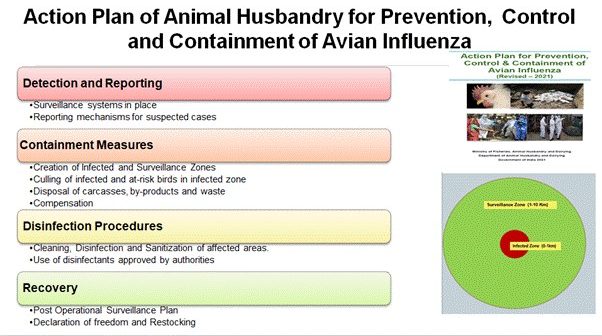The Department of Animal Husbandry & Dairying (DAHD), under the Ministry of Fisheries, Animal Husbandry, and Dairying, has announced a comprehensive strategy to tackle Avian Influenza outbreaks in India. In a high-level meeting held on April 4, 2025, in New Delhi, policymakers, veterinary experts, and poultry industry leaders convened under the leadership of Secretary Alka Upadhyaya to address the growing threat of the disease and implement preventive measures.
The government has mandated strict biosecurity measures for poultry farms, including enhanced hygiene protocols, restricted access, and compulsory registration with state animal husbandry departments. Surveillance efforts have been intensified to track the disease more effectively, and predictive modeling is being explored to enable early detection. The Secretary emphasized the importance of safeguarding the poultry sector, which is vital for food security and rural livelihoods, and called for a collaborative approach to build long-term resilience against Bird Flu.
A significant development is the approval of the H9N2 vaccine, developed by ICAR-NIHSAD, Bhopal, which is now commercially available. A national study will assess its efficacy, while discussions are ongoing about the potential use of vaccines for Highly Pathogenic Avian Influenza (HPAI). Experts have noted limitations in HPAI vaccines, such as the inability to provide sterile immunity, but efforts are underway to develop an indigenous vaccine that meets global standards.
The meeting highlighted the recurring challenge of Avian Influenza in India, which has affected both poultry and wildlife since its first detection in 2006. This year, the virus has shown cross-species transmission, with confirmed cases in wild birds and big cats. Between January 1 and April 4, 2025, the disease impacted eight states, including Maharashtra, Chhattisgarh, and Andhra Pradesh, with 34 epicenters reported, six of which remain active. Non-poultry species such as tigers, leopards, and jungle cats have also been affected in states like Maharashtra and Goa.
The DAHD has intensified containment measures, including the culling of infected birds, movement restrictions, and disinfection of outbreak zones. Daily reporting from states, increased surveillance during high-risk periods, and enhanced coordination between central and state authorities are part of the action plan. The government also provides compensation to farmers under the Livestock Health and Disease Control Scheme, sharing costs with states to ensure economic stability alongside effective disease management.
India has contributed to the global fight against Avian Influenza by sharing sequencing data of H5N1 isolates with international networks. With ongoing research and a unified effort from government and industry stakeholders, the nation aims to strengthen its resilience against future outbreaks.





